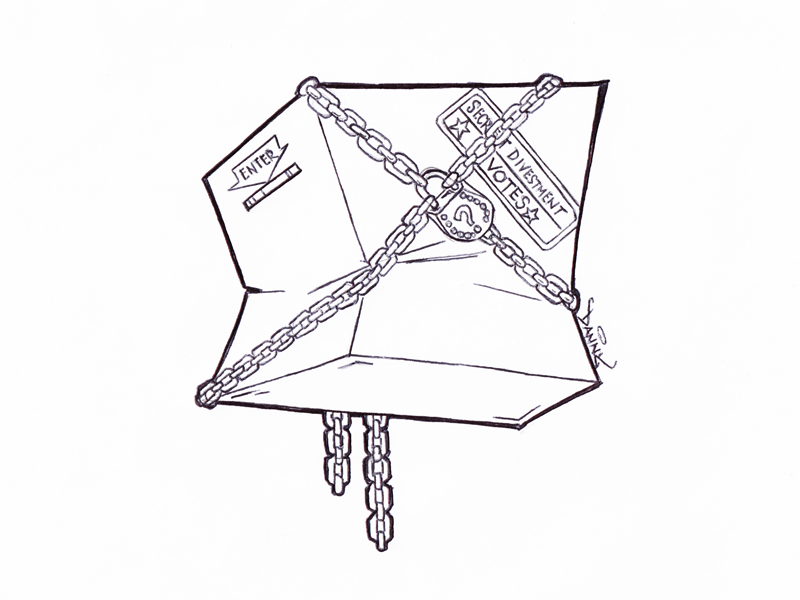
On April 23, ASUCR passed Senate Resolution 18, which calls upon the UC to remove its financial holdings, or divest, from American companies, such as Caterpillar, that support the alleged human rights abuses conducted by the Israeli government against the citizens of Palestine. But many of the details surrounding the passage of this resolution point to how our own student government has failed to maintain democratic values regarding this issue.
First off, the April 23 vote wasn’t the first time that ASUCR decided to bring up divestment. A previous vote on Feb. 18 failed to pass by 6-7-1, even as a previous divestment resolution had actually passed March 7 of last year. The resolution was later controversially rescinded, but it’s discouraging to think of how indecisive our student government can be when they keep flip-flopping on something so important as divestment.
But what’s worse is the fact that no matter what ASUCR decides to vote on regarding divestment, no matter how much they choose to flip-flop on the issue — it doesn’t really affect UC policy. The UC Board of Regents will only enforce a policy of divestment against Israel when the United States government decides to denounce Israel for committing acts of genocide. Our federal government is currently not doing so.
Creating dialogue on a touchy subject in a higher institution of learning is of course important, but why vote on a resolution? This is a retelling of “The Emperor’s New Clothes,” where our student government merely votes on a policy that doesn’t change as much as it hopes to. This is an important dialogue that needs to be had, but why stir up divisions with this kind of vote? Why try to create dialogue with a vote that doesn’t affect the government’s policy? The vote may be symbolic, but in the end the world remains as it is.
Also, just like its previous vote, ASUCR decided to make the April vote a secret ballot. Because as everybody knows, there’s no better way to practice representative democracy than by hiding votes from the students who elect them. Very smooth indeed.
Now, most people are familiar with the two camps that surround the core of this conflict. The center of the conflict is between Israel’s right to exist as a Jewish state, an occurrence stemming from complex geopolitical reasons, including the horrors of the Holocaust, and the right of the Palestinian people to resist what they see as an Israeli takeover of the region. There’s been a lot of blood spilled on both sides throughout the last seven decades, from the Six-Day War of 1967 and Yom-Kippur War of 1973 where Israel militarily defeated its neighbors, to Israel allegedly displacing over a quarter-million Palestinians from their homes since its initial occupation of the West Bank and Gaza. Palestinian attacks from the First and Second Intifada were one of the reasons why Israel decided to create the West Bank barrier and its military checkpoints, which many accuse of limiting the freedom of movement for Palestinians. The point here isn’t to defend one side over the other, but rather to agree upon the established, historical fact that both sides of this conflict have committed alleged humanitarian crimes upon each other, no matter the justifications, and that both sides of the coin need to be evenly and fairly addressed.
And this is the heart of the matter regarding political idealism.
In Senate Resolution 18, nearly every single line of blame was brought against Israel, not once calling out any actions taken by Palestinians. There are several things that SR 18 could have addressed regarding Palestine’s alleged human rights abuses. For example, it is documented that Hamas, the group that governs the Palestinian Gaza Strip, launched more than 1,800 rockets into Israeli civilian populations in 2012 alone. They have also detained and executed several civilians without due process. I will again assert that I am not arguing that one side of this conflict is just or in the right, but that both sides have committed several actions that need to be sorted out.
Unfortunately, it appears that our student government just wants to find fault with one side for its alleged humanitarian crimes. How is it that our own student government can pass unfair legislation that only discusses one whole side of a complicated political conversation, without even revealing their own votes or having any practical effect? SR 18 has done no good for opening up future dialogue on the issue. If our student government — or any government for that matter — wants to exercise useful dialogue on the Israeli-Palestinian conflict, they cannot toss up legislation and say that it is done in the name of democracy when the legislation only represents half of the equation, so to speak.
The many conundrums of our own student government will create a future where they’re only listening with one ear, to legislation with one perspective. That’s anything but ideal.








